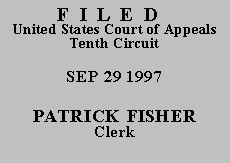

| KENNETH R. SELLERS, |
No. 97-3188 |
| v. |
(D. Kansas) |
| LOUIS E. BRUCE, Warden; CHARLES SIMMONDS, Secretary of Corrections; (NFN) STEDEMAN, Unit Team, El Dorado Correctional Facility; (NFN) ROGAN, Unit Team, El Dorado Correctional Facility; (NFN) STUDEE, Unit Team, El Dorado Correctional Facility, |
(D.C. No. 97-CV-3251) |
Kenneth R. Sellers, an inmate at the Ellsworth Correctional Facility, brought this pro se action pursuant to 42 U.S.C. § 1983 claiming that his constitutional rights were violated by the defendants' refusal to establish his parole violator term under the Kansas Guidelines Sentencing Act, specifically K.S.A. 1993 Supp. 22-3717(f).
K.S.A. 1993 Supp. 22-3717(f) was in effect between July 1, 1993, and March 24, 1994, and provided that "if an inmate was sentenced for a felony committed after July 1, 1993, while on parole or conditional release for a felony committed prior to July 1, 1993, the old sentences would be converted into a determinate sentence." The length of the converted sentence depended on the class of the preguidelines felony. Effective March 24, 1994, K.S.A. 1993 Supp. 22-3717(f) was amended so that preguidelines sentences would not be converted.
State v. Bissell, No. 76,333, 1997 WL 429621 (Kan. App. Aug. 1, 1997) (quoting Payton v. State, 923 P.2d 1059 (Kan. App. 1996)).
The district court construed this action as a petition for a writ of habeas corpus filed pursuant to 28 U.S.C. § 2254, and dismissed the action without prejudice to permit Mr. Sellers to exhaust his state court remedies. Upon reviewing the record, and Mr. Sellers' arguments, we conclude that the district court was correct for the reasons stated in the district court's order filed June 19, 1997.
Mr. Sellers filed his habeas petition in the district court on June 5, 1997. Accordingly, we review his petition and appeal under 28 U.S.C. §§ 2253 and 2254, as amended by the Antiterrorism and Effective Death Penalty Act of 1996 ("AEDPA"), Pub. L. No. 104-132, 110 Stat. 1214 (1996) (effective April 24, 1996), and treat the posture of this case as a renewed application for a certificate of appealability. See 28 U.S.C. § 2253(c)(1). Because Mr. Sellers has not made a substantial showing of the denial of a constitutional right, see § 2253(c)(2), we DENY a certificate of appealability and DISMISS the appeal. The mandate shall issue forthwith.
ENTERED FOR THE COURT
Stephen H. Anderson
Circuit Judge
*.This order and judgment is not binding precedent, except under the doctrines of law of the case, res judicata, and collateral estoppel. The court generally disfavors the citation of orders and judgments; nevertheless, an order and judgment may be cited under the terms and conditions of 10th Cir. R. 36.3.